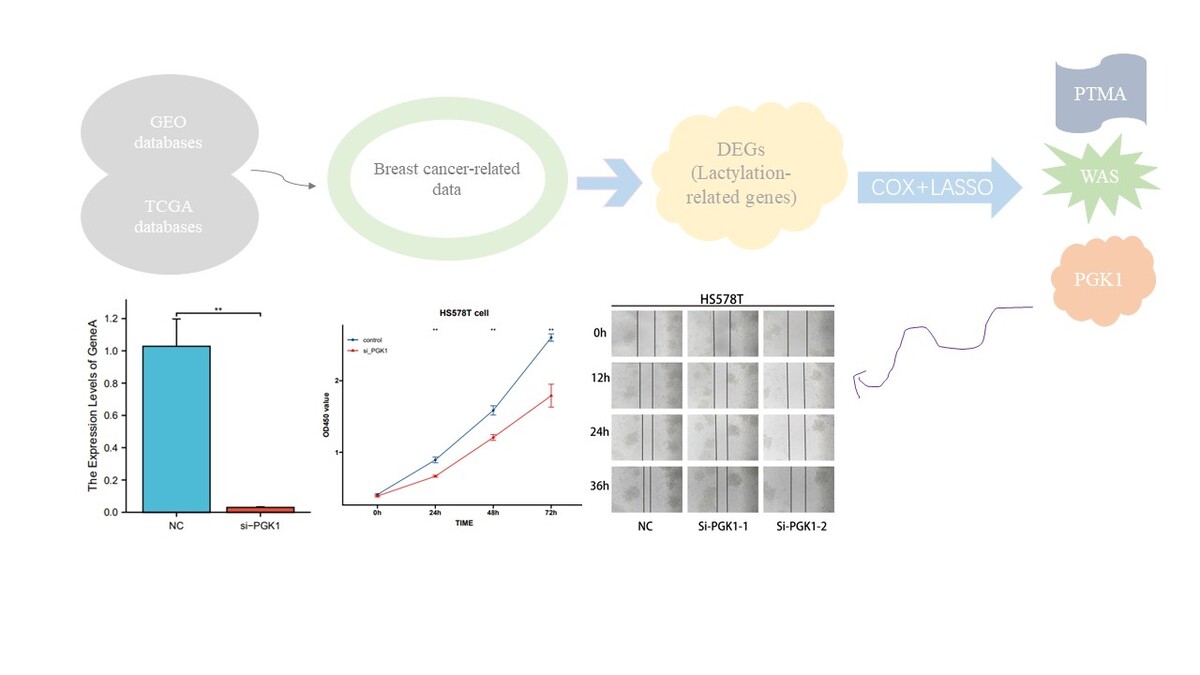Current issue
Archive
Manuscripts accepted
About the Journal
Editorial office
Editorial board
Section Editors
Abstracting and indexing
Subscription
Contact
Ethical standards and procedures
Most read articles
Instructions for authors
Article Processing Charge (APC)
Regulations of paying article processing charge (APC)
ONCOLOGY / RESEARCH PAPER
RNA-seq-based elucidation of lactylation in breast cancer
1
Affiliated Hospital of Yan 'an University, China
2
Hanzhong Central Hospital, China
Submission date: 2023-12-01
Final revision date: 2024-03-07
Acceptance date: 2024-04-01
Online publication date: 2024-04-13
KEYWORDS
TOPICS
ABSTRACT
Introduction:
Lactylation is the covalent modification of histones using lactate as a small molecule precursor, playing a role in epigenetic regulation. As a novel protein post-translational modification, it has demonstrated significant relevance in the field of cancer diagnosis and therapy. However, the interaction between lactylation and tumor cells in breast cancer has not been extensively investigated.
Material and methods:
We acquired breast cancer-related data from the GEO and TCGA databases. Lactylation-related genes were identified from the differentially expressed genes. We utilized COX and LASSO regression to identify genes with significant prognostic value for constructing a prognostic model and assessing its predictive performance. This model was integrated with clinical parameters to create a nomogram. Finally, we conducted immune infiltration analysis, analyzed differences in biological functions, and assessed drug sensitivity.
Results:
We ultimately identified 3 lactylation-related genes significantly associated with prognosis. These genes were used to construct a prognostic model and calculate a risk score. Using the median score, patients were divided into high-risk and low-risk groups. Notably, the low-risk group patients exhibited better prognosis and higher levels of immune infiltration. GO/KEGG enrichment analysis revealed that PGK1, the gene with the highest HR among these genes, is widely involved in immune, metabolic, and proliferative signaling pathways. Its high expression also correlates with increased sensitivity to anti-tumor drugs.
Conclusions:
We showcased the potential of lactylation-based molecular clustering and prognostic profiling for predicting survival, immune status, and treatment response in breast cancer patients. Additionally, we envision the utilization of PGK1 as a diagnostic marker and therapeutic target in the cancer.
Lactylation is the covalent modification of histones using lactate as a small molecule precursor, playing a role in epigenetic regulation. As a novel protein post-translational modification, it has demonstrated significant relevance in the field of cancer diagnosis and therapy. However, the interaction between lactylation and tumor cells in breast cancer has not been extensively investigated.
Material and methods:
We acquired breast cancer-related data from the GEO and TCGA databases. Lactylation-related genes were identified from the differentially expressed genes. We utilized COX and LASSO regression to identify genes with significant prognostic value for constructing a prognostic model and assessing its predictive performance. This model was integrated with clinical parameters to create a nomogram. Finally, we conducted immune infiltration analysis, analyzed differences in biological functions, and assessed drug sensitivity.
Results:
We ultimately identified 3 lactylation-related genes significantly associated with prognosis. These genes were used to construct a prognostic model and calculate a risk score. Using the median score, patients were divided into high-risk and low-risk groups. Notably, the low-risk group patients exhibited better prognosis and higher levels of immune infiltration. GO/KEGG enrichment analysis revealed that PGK1, the gene with the highest HR among these genes, is widely involved in immune, metabolic, and proliferative signaling pathways. Its high expression also correlates with increased sensitivity to anti-tumor drugs.
Conclusions:
We showcased the potential of lactylation-based molecular clustering and prognostic profiling for predicting survival, immune status, and treatment response in breast cancer patients. Additionally, we envision the utilization of PGK1 as a diagnostic marker and therapeutic target in the cancer.
Share
RELATED ARTICLE
We process personal data collected when visiting the website. The function of obtaining information about users and their behavior is carried out by voluntarily entered information in forms and saving cookies in end devices. Data, including cookies, are used to provide services, improve the user experience and to analyze the traffic in accordance with the Privacy policy. Data are also collected and processed by Google Analytics tool (more).
You can change cookies settings in your browser. Restricted use of cookies in the browser configuration may affect some functionalities of the website.
You can change cookies settings in your browser. Restricted use of cookies in the browser configuration may affect some functionalities of the website.



